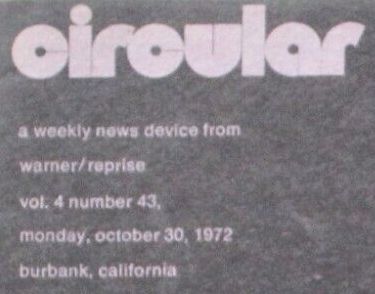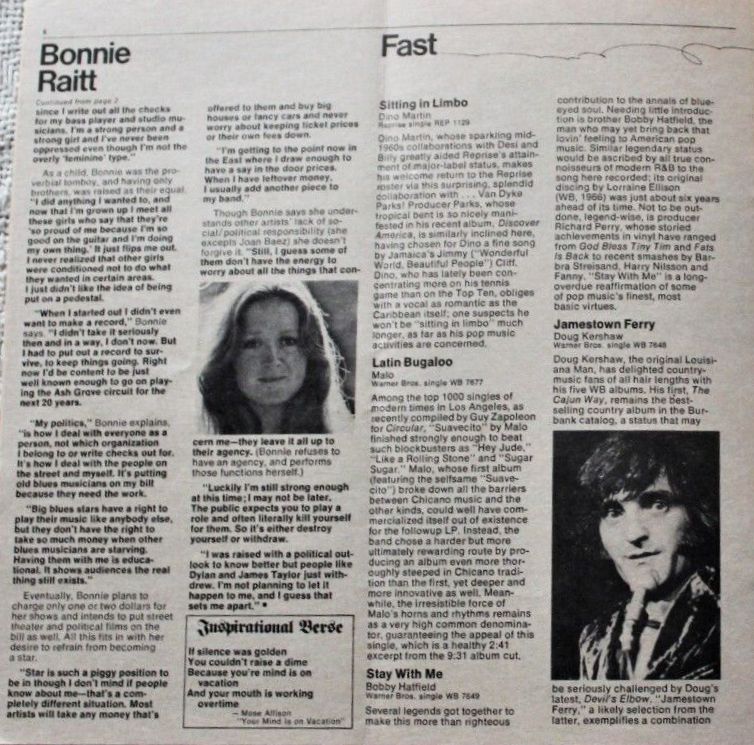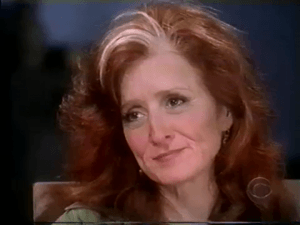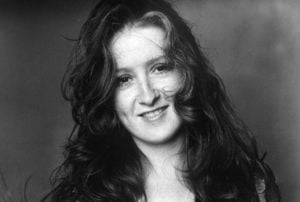
Bonnie Raitt is warm and disarming. She smiles, you smile, yet at 22 she is already aware of both the advantages and consequences of her chosen way of life.
“All I’m trying to do is revolutionize the business in my own way, and I’m just doing it in the most righteous way possible – not screwing people or ripping anybody off,” she says. If I happen to get famous because of what I’m trying to accomplish, fine, but on a personal level it scares me. I’d rather be just as I am since I’m starting to lose my privacy.”
Stemming from a sense of social responsibility and political consciousness nurtured at any early age, Bonnie sees life as a series of compromises, but feels everyone should be answerable for the choices.
Her viewpoints make clear why she chose to sign with Warner Bros. instead of Arhoolie Records. “Warner Bros. gives me a total budget (instead of advances) that I put into one account and decide what to do with,” Bonnie explained.
“So I’m carrying off some innovative ventures in accordance with my belief that artists should take only what they need to live on from performance, record and royalty money and find ways to redistribute or give back the rest. Everybody’s just out to take all the money they can. I’m just trying to do something different.”
For example, using the record company money given her to do the first album, Bonnie decided to take a chance on a friend who was in the process of setting up his own studio and needed some money to get off the ground. She provided the cash and although he had only four track equipment, recorded with him.
“My first album was done in a garage in Minneapolis, but I wasn’t trying for the perfect record. Some of the money I had went to musicians who had never played a session before, but they were friends who needed the cash to go on doing the kind of music they wanted to. Besides, the guy with the studio, Dave Ray, now puts out records for $2.00-$2.50 and each contains a complete accounting of how every penny is spent. I really believe in that sort of thing.”
Bonnie is strangely reticent about her good fortune. The typical success story is what she’s trying to avoid. “I don’t have any desire to become a star, or rich or a cult figure. I like performing at night and traveling around running my life. Besides, playing guitar is something I’ve always done anyway.”
How does her life affect her work?
“My main motivations are political in an unusual sort of way. To me, politics is relating to and caring about people. I Just want to have a good time and give the audience something worthwhile. My primary interest is in how I’m doing things and I don’t care If I sing good or bad, play up to par or write the most original songs. That’s irrelevant.”
Onstage, Bonnie and her bass player, Freebo, who looms quietly but effectively behind her, are at home with almost any audience. Her choice of music ranges from old blues to originals to songs by friends and peers Joni Mitchell, Jackson Browne, Chris Smither and Joel Zoss to 60s standards such as “I Know” (Barbara George), “Walk on By,” “Since I Fell for You” and Stephen Stills’ “Bluebird.” Bonnie’s vocals are clear, strong and level with just the right amount of feeling. Above all, they are fresh and honest.
The daughter of musical-comedy star John Raitt (Carousel, The Pajama Game), Bonnie was born in Burbank, but was shuttled across the country a number of times before finally settling in Los Angeles (for a while) in 1957.
“I hated Los Angeles,” she recalls.
But her parents’ reluctance to dive headlong into the blossoming Hollywood/Beverly Hills social scene saved Bonnie from the experience of growing up with the sons and daughters of show business acquaintances. Instead, she divided her time between school, records, guitar and a Quaker-oriented camp in the summer.
“It was the camp that put me in a social situation with leftist type people,” says Bonnie, brushing hair away from her freckles.
“I was around activities that had no basis in my Los Angeles world or the schools I went to-you know, Pete Seeger, Joan Baez, SNCC, pacificism and all that. I managed to absorb most of my political values from that atmosphere.”
Growing up in Los Angeles, Bonnie never took to surf, folk or white rock music. For her it was soul music, dancing, drinking, partying and disinterest in the 60s beach fads.
At 13 she was already listening to Son House, John Hammond and John Hurt-mostly because she liked them and partially as a result of her rebellious nature.
Moving east, Bonnie attended college for a while. She also hung out at Boston’s Club 47 long enough to realize she could sing and play better than a lot of the second acts that were being booked.
“l was sick of working in the daytime and I needed money to live, so I gave it a try.”
As Bonnie began to circulate, her reputation preceded her. The gigs eventually led to the Gaslite in New York and the Main Point in Philadelphia as well as that city’s Folk Festival. A record contract soon followed. She now has two albums on Warner Bros.—Bonnie Raitt and Give It Up.
Bonnie speaks about the problems she faces as a woman on the road:
“Some things make it difficult for me to adjust. For instance, if I were to meet a guy I liked, I couldn’t just drag him along with me the way a guy can take a chick. It would be a strange, masculine situation for me although it’s already something I have to a degree since I write out all the checks for my bass player and studio musicians. I’m a strong person and a strong girl and I’ve never been oppressed even though I’m not the overly ‘feminine’ type.”
As a child, Bonnie was the proverbial tomboy, and having only brothers, was raised as their equal.
“I did anything I wanted to, and now that I’m grown up I meet all these girls who say that they’re ‘so proud of me because I’m so good on the guitar and I’m doing my own thing.’ It just flips me out. I never realized that other girls were conditioned not to do what they wanted in certain areas.
I just didn’t like the idea of being put on a pedestal.”
“When I started out I didn’t even want to make a record,” Bonnie says. “I didn’t take it seriously then and in a way, I don’t now. But I had to put out a record to survive, to keep things going. Right now I’d be content to be just well known enough to go on playing the Ash Grove circuit for the next 20 years.
“My politics,” Bonnie explains, “is how I deal with everyone as a person, not which organization I belong to or write checks out for. It’s how I deal with the people on the street and myself. It’s putting old blues musicians on my bill because they need the work.
“Big blues stars have a right to play their music like anybody else, but they don’t have the right to take so much money when other blues musicians are starving.
Having them with me is educational. It shows audiences the real thing still exists.”
Eventually, Bonnie plans to charge only one or two dollars for her shows and intends to put street theater and political films on the bill as well. All this fits in with her desire to refrain from becoming a star.
“Star is such a piggy position to be in though I don’t mind if people know about me — that’s a completely different situation. Most artists will take any money that’s offered to them and buy big houses or fancy cars and never worry about keeping ticket prices or their own fees down.
“I’m getting to the point now in the East where I draw enough to have a say in the door prices.
When I have leftover money, I usually add another piece to my band.”
Though Bonnie says she understands other artists’ lack of social/political responsibility (she excepts Joan Baez) she doesn’t forgive it. “Still, I guess some of them don’t have the energy to worry about all the things that concern me — they leave it all up to their agency. (Bonnie refuses to have an agency, and performs those functions herself.)
“Luckily I’m still strong enough at this time; I may not be later. The public expects you to play a role and often literally kill yourself for them. So it’s either destroy yourself or withdraw.
“I was raised with a political outlook to know better but people like Dylan and James Taylor just withdrew. I’m not planning to let it happen to me, and I guess that sets me apart.”
Sunday, Oct.22, 1972 — Special to Circular
New York City — Deep in the heart of Hell’s Kitchen (Midtown West Side to Big Apple neophytes) lies Jerry Ragovoy’s aptly named Hit Factory — a record studio known for its social as well as technical mixing abilities.
Huddled over and around the console are four hirsute and somewhat disreputable characters — Bonnie Raitt, the fair-haired woman of song and slide; producer Michael Cuscuna, the main mixer man; Harry, the smiling engineer; Freebo, former jock and current bass player for first and second Raitt albums and appearances, and Prune, the omnipresent Raitt canine and possessor of the skimpiest tail in the recording industry.
The occasion is the final mix of Joel Zoss’ “Stayed Too Long at the Fair,” from Bonnie’s latest album (Side Two, Cut One) for release as a single.
Breaths bated (and just a bit boozed), ears focused on the electronic trappings of studioland, tracks readied (including a new string part by ever-ready studio fiddlers, new guitar by Bonnie and occasional spicy lick by Little Feat’s Lowell George) and the final mix begins.
Will Bonnie Raitt have her first hit? Will “Stayed Too Long at the Fair” garner the ever-coveted bullet? Will Prune untangle herself from 12 feet of tape? Tune in to future issues of Billboard, Cash Box or Record World for the exciting sequel to our gang at the Hit Factory.
















 Visitors Today : 25
Visitors Today : 25 Now Online : 0
Now Online : 0















































































































